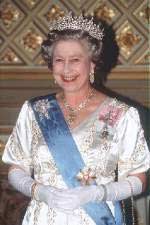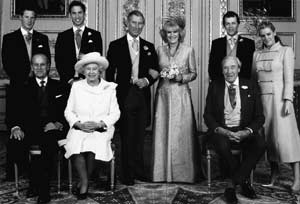|
Her Majesty (2)
Happy and Glorious
Since her accession, Queen Elizabeth II has had to respond to many situations unimaginable half-a-century ago. Faced with messy divorces, revision of protocol and harsh criticism from her once-admiring press and public, Her Majesty has called upon her years of professionalism to help her through.
 Virtually every book written about Queen Victoria contains the comment that the august lady presided over an era of rapid and unprecedented change. Population distribution, growth of industrialisation, expansion of empire, exciting discoveries from anaesthetics to X-rays, exploration and education for the masses – it was an exciting time to be alive. If that were true of Victoria it is equally true of her great-great-granddaughter, Queen Elizabeth II. During the course of her reign man has travelled to the moon, transplanted hearts, lungs and livers, cloned animals and tinkered1 with DNA. It has been, indeed it is an exciting if challenging time to be alive – but there the similarity ends. For all the change Victoria’s reign encompassed, one constant remained: an innate2, largely unquestioning reverence3 for royalty and what it represented. The Royal Family was viewed by the general public with a kind of dazzled awe4. Newspaper reports were invariably admiring and respectful and that all-seeing and invasive5 eye called television lay far in the future.
Virtually every book written about Queen Victoria contains the comment that the august lady presided over an era of rapid and unprecedented change. Population distribution, growth of industrialisation, expansion of empire, exciting discoveries from anaesthetics to X-rays, exploration and education for the masses – it was an exciting time to be alive. If that were true of Victoria it is equally true of her great-great-granddaughter, Queen Elizabeth II. During the course of her reign man has travelled to the moon, transplanted hearts, lungs and livers, cloned animals and tinkered1 with DNA. It has been, indeed it is an exciting if challenging time to be alive – but there the similarity ends. For all the change Victoria’s reign encompassed, one constant remained: an innate2, largely unquestioning reverence3 for royalty and what it represented. The Royal Family was viewed by the general public with a kind of dazzled awe4. Newspaper reports were invariably admiring and respectful and that all-seeing and invasive5 eye called television lay far in the future.
At its beginning Queen Elizabeth II’s reign had a strikingly similar feel to it. After the initial wave of genuine grief at the premature death of her father George VI, the nation turned towards the newly proclaimed ruler with huge warmth and expectation. The ‘Shirley Temple6’ baby princess, blue of eye and golden of curl, had metamorphosed into a pin-up7 girl, a glowingly pretty young mother and wife with a pin-up prince by her side.
The Victorian constitutionalist Walter Bagehot had commented: ‘A family on the throne is an interesting idea... It brings down the pride of sovereignty8 to the level of petty life.’ People felt they could identify with the new young Royal Family. As the legendary Wall Street wizard Bernard Baruch remarked in 1953, ‘England now had three assets9: her Queen “the world’s sweetheart”, Winston Churchill, and her glorious historical past’. Churchill himself was besotted10 by the new sovereign: his half-hour audiences stretched to three times that length.
A new Elizabethan age had begun, but it was still an age of hats, gloves, corsets and curtseys11. The youthful monarch’s upbringing and isolation from the world beyond the Palace gates had been little different to her Victorian ancestors. There was still a feeling of apartness12, of regal13 distance and dignity, a feeling enforced by a largely inherited set of courtiers and advisers. Many of these grey men in even greyer suits – whose age and gravitas14 made a striking contrast to the youth and vibrancy15 of the Queen – had helped to stabilise a throne rocked by the Abdication16 Crisis of 1936. They had held it steady through the war years. Change was viewed with suspicion but change was in the air. Elizabeth could enter the homes of her subjects17 as never before through the medium of18 television. In fact the whole issue of televising the Coronation ceremony sets the scene for much of the future flavour of the reign. Elizabeth herself at first sided with traditionalists who did not want television cameras present, fearful perhaps of losing the ‘mystique’ and magic of royalty by exposure. Huge press and public outcry followed. Increasingly aware of the furore, the Queen ultimately agreed to a compromise: the service could be televised but not her Holy Communion19 and anointing20, the most private and sacred moments.

The Prince of Wales, the new Duchess of Cornwall and families after their wedding at Windsor on 9 April 2005
The press and public had vociferously insisted on their rights – and their rights had been allowed. The sovereign had bowed to public pressure at the very outset of her reign. She would continue to do so at crucial points in the years that followed and in doing so would irrevocably alter the monarchy’s image and its place in the public’s perception.
Harold Macmillan21 once commented that ‘she took her Commonwealth responsibilities very seriously and rightly so, for the responsibilities of the UK monarchy had so shrunk that if you left it at that you might as well have a film star’. The young Queen with film-star looks welcomed so rapturously22 in the far flung23 corners of her Commonwealth has matured into a Head of State equipped with formidable amounts of experience and political understanding and insight. Labour politician Barbara Castle once paid tribute to this when she remarked that she ‘respected her [the Queen] as a true professional. She was most conscientious, did her homework... adapted to each situation, changing ministers and governments... was professionally discreet above everything’.
Professionalism and discretion are certainly qualities the Queen has had to draw heavily upon during her reign, particularly the last 20 years of it. The structure of society and its values has changed drastically and her own family, almost against its will, has become a very public mirror image of some of those changes, especially when it comes to the thorny24 issues of marriage and divorce.
Royalty has always been the subject of gossip, but even at the height of the Abdication Crisis there was a reticence25 on the part of the press, a kind of gentlemen’s agreement not to publish damaging details until there was no avoiding it. Princess Anne’s divorce and subsequent remarriage created relatively few ripples. However, by the time the marriage of the Prince of Wales and the beautiful, iconic Diana was disintegrating the gloves were off26. The newspapers vied with each other to publish sensational and destructive revelations, often aided and abetted27 by the two people they were writing about. Transcriptions of tacky28 telephone conversations and confessions of infidelity on prime-time television added fuel to the flames and tarnished29 the Royal Family’s image. The Queen did not know how to deal with it.
Queen Elizabeth has been an extremely successful monarch. A peerless professional and dignified Head of State, at times her main failing has been a slowness of response to situations that has lead to misunderstanding. Much of this could be attributed to the advisors she has chosen to surround herself with, some of whom have owed their positions to tradition rather than talent. King Farouk of Egypt once said that one day the only royal houses left would be hearts, diamonds, clubs, spades30... and Windsors! He seems to have had a point and at 80 years of age Queen Elizabeth II tirelessly continues to play her ever-changing role.
1 to tinker – (зд.) возиться
2 innate – врожденный
3 reverence – почтение
4 awe – благоговение
5 invasive – докучливый
6 Shirley Temple – американская кинозвезда 30-х годов, которая снималась лишь в раннем детстве.
7 pin-up – фотография кинозвезды, вырезанная из журнала и приклеенная на стену; физически привлекательный человек (как юноша, так и девушка);
8 sovereignty – верховная власть
9 asset – (зд.) ценность
10 besotted – одурманенный
11 curtsey – реверанс
12 apartness – изолированность
13 regal – королевский
14 gravitas – (лат.) основательность
15 vibrancy – нерешительность
16 Abdication – вынужденное отречение от престола короля Эдуарда VIII (в связи с его женитьбой на дважды разведённой американке)
17 subject – подданный
18 through the medium of – посредством
19 Holy Communion – святое причастие (главное таинство англиканской церкви)
20 anointing – помазание
21 Harold Macmillan – премьер-министр Великобритании (1957-63)
22 rapturously – восторженно
23 far-flung – широко раскинувшийся
24 thorny – трудный (о вопросе и т. п.)
25 reticence – умалчивание
26 the gloves were off – церемониться перестали
27 to abet – подстрекать
28 tacky – вульгарный
29 tarnish – бесчестить
30 hearts, diamonds, clubs, spades – черви, буби, трефы, пики
Читать еще в этой рубрике:
Читать еще в этом номере:
|
|











